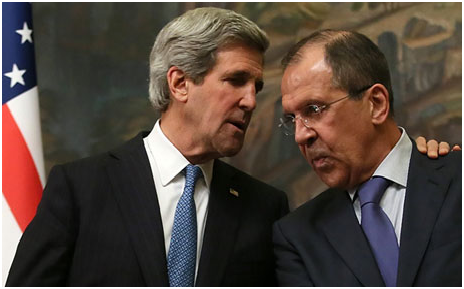Is There A Kerry-Lavrov Understanding, Faltering But Steady?
US' John Kerry and Russia's Sergey Lavrov

NEW DELHI: Right wing opinion in the US with Think Tanks like Brookings in the Vanguard is now firm: Shia-Sunni conflict will define West Asian politics in the foreseeable future. The way the dice is loaded at the moment, the West sees its interests served best in alliance with the Sunnis. There is an unstated acceptance of Sunni terrorism as an asset.
At a recent seminar in New Delhi, Strobe Talbott, Deputy Secretary of State with President Bill Clinton, minced no words: Moscow will be made to pay by Sunni Muslims in Russia’s backyard for what Putin is doing in Syria.
The implication is that Russian intervention in Syria is decisively helping President Bashar al Assad to remain in power. In the altered vocabulary in West Asia, Assad is not a Baathist but an Alawite leader and Alawites are a variety of Shia who are mortal enemies of Sunnis.
What Talbott is implying is this: for the reverses being heaped on them, the Sunnis are going to take revenge on Russia. Muslim populations across the Caucasus would plague Putin with masterstrokes of terrorism.
When ex Saudi Intelligence Chief, Prince Bandar bin Sultan turned up at the Kremlin on July 31, 2013, his conversation with Putin contained just the sort of threat Strobe Talbott’s response exuded. If only Putin would give him Assad’s head on a platter, Bandar would give him the moon. Sochi Winter Olympics would pass without a terrorist incident. Bandar claimed considerable control on terrorist groups in the region.
Americans are miffed that all their efforts at regime change in Damascus atleast since August 2011 have been in vain. How many times ex Secretary of State and now Democratic front runner, Hillary Clinton, imperiously waved her hand: “Get out of the way Assad.”
Well, Assad is still in the Damascus Presidential Palace, exactly as this column had predicted in September 2011. The argument was straightforward. The US had occupied Iraq in April 2003. It had dismantled the Baath Party structure, the army, Presidential guards, the mukhabirat (intelligence), stayed in Iraq for over a decade and then left without any identifiable war aims achieved.
Yes, the Shias in the south oppressed, by Saddam Hussain, were thrilled. Naturally they co-operated – but only upto a point. So moved was Thomas Friedman of the New York Times that he recommended Ayatullah Sistani for the Nobel Peace Prize.
If the Iraqi melodrama now in its twelfth year, has not yet concluded to American advantage, how would Assad, controlling a power structure which is the mirror image of Baghdad, be dislodged by mere cross border terrorism, armed and supported by regional powers and their western patrons but who have, in the midst of battle, been at cross purposes.
Eversince the Russians entered Syria everybody’s bluff is being called. The most embarrassed of the lot has been US Secretary of Defence Ashton Carter. Militants being trained by US officers, surrendered their weapons to heaven knows who and sought safe passage.
Carter had to sheepishly announce to the media that a secret $500 million training programme in Syria has been abandoned. Other, unreported projects in Syria are apparently in similar disrepair. In a Congressional hearing, Senator John McCain asked Carter: “what evidence do you have that the IS was being defeated.” A flustered Defence Secretary said: “Momentum was being built against the IS.”
Meanwhile, Carter’s counterpart in the State Department has proceeded deftly in a terrain full of mines. Unadvertised, the Kerry-Lavrov duet had since their May 12 joint announcement worked towards a political settlement in Damascus. Like good diplomats they proceeded with a script which could be given a suitable spin in Washington as well as in Moscow.
Lavrov could say that Assad will be required in the interim but the future of Syria will be determined by the Syrian people. Kerry meanwhile could cope with Saudi Arabia’s tantrums by saying that Assad’s future was in the balance. In essence Lavrov’s and Kerry’s formulations do not contradict each other.
Under this over all understanding, a ceasefire has been declared in Yemen. Saudis and the Houthis are talking.
The long standing impasse on naming the Lebanese President has been broken. Suleiman Frangieh could well be the consensus candidate.
The US signal to regional players to form an Arab army to fight the IS has prompted the Saudis to scramble and announce an army without soldiers. Various countries, including Pakistan, in the Saudi list have denied they were ever consulted.
Why this Saudi impatience to announce an Arab army without any prior consultations? What is the Saudi anxiety? The answer may lie in a counter question: which is the battle ready Arab army with an incentive to destroy the IS? The Syrian army, ofcourse.



